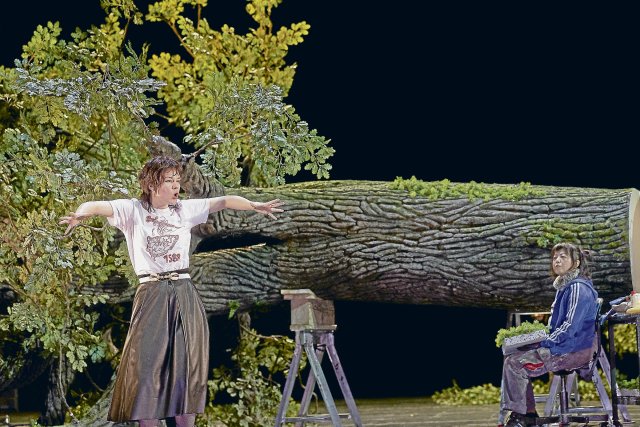The evening doesn’t really get going: Linn Reusse (left) and Sachiko Hara on the stage of the Schauspielhaus
Photo: ©Matthias Horn
The tree is felled. At least it turns vertically on the stage of the Deutsches Schauspielhaus Hamburg designed by Katrin Brack, it is already partially dismantled, there is a gap between root and trunk. Strange: A man screws twigs to the branches. A woman attaches greenery to the trunk. Inside there is a chamber with shelves.
Virginia Woolf’s fictional character Orlando, an English nobleman from the 16th century, dedicated a poem to a tree, or more precisely an oak tree. This appears in Woolf’s famous work “Orlando. A Biography” only in 1928, the year the novel was published – Orlando is still alive then. This brings it to several hundred years. Director Jossi Wieler even extends Orlando’s lifespan in his production of the material up to the present day: several times one of the actresses who tell this fantastic story places its provisional end in January 2024.
Woolf experienced her breakthrough as an author with “Orlando”. The novel was actually intended as a little “escapade” after an intensive period of work. It may have been created in just a few months, but it is still cleverly constructed. The transformation of its main character from man to woman made it a feminist classic – but that’s not all it’s about.
Orlando lives the life of a nobleman, is initially protected by Queen Elizabeth I, later falls into disgrace because he gets involved with a domestic servant, then falls in love with a princess from Moscow, but she abandons him. He withdraws and begins to write, but even in this respect his efforts are not met with approval. Finally he has himself sent as an envoy to Constantinople. During an uprising against the Sultan, Orlando falls into a deep, days-long sleep that saves his life. Because the insurgents kill all foreigners they can get their hands on. When Orlando awakens, he is a woman. Later she will fall in love with the gender-undetermined captain Marmaduke Bonthrop Shelmerdine, marry him, and even later her hymn to the oak tree will be published.
Their materialization on the stage in Hamburg has to endure a lot. A storm partially ruined the laborious construction process, and this tree wasn’t fully assembled until the end of the evening. In Woolf, as in Wieler’s production (stage version: Ralf Fiedler), this is a symbol of a major theme: it is not just about the dissolution of gender roles, but also about the questionability of the concept of identity itself and the questionability of the great narratives: »Mother Nature, which has so much to answer for,” it says in “Orlando,” “has also managed to ensure that the entire hodgepodge is only loosely strung together with a single thread. The seamstress is memory, and she is a fickle seamstress.’
It is of course no coincidence that Orlando becomes a woman in Constantinople of all places. Today’s Istanbul was a multicultural hotspot. Woolf also places Orlando’s transformation in the period of the decline of the Ottoman Empire, when the city became a plaything for imperialist ambitions. Here and elsewhere, “Orlando” comments on circulating social ideas with subtle humor.
On stage, however, these aspects are ignored, where Sandra Gerling, Linn Reusse, Hildegard Schmahl, Bettina Stucky and Julia Wieninger seem to summarize Orlando’s adventures, inspiring, clarifying and correcting each other. This is beautifully done in its own right. But against the backdrop of the giant oak tree rotating rather leisurely in front of us, the evening is more like a long, calm river than a dazzling, miraculous creature. The costumes (Anja Rabes) play with Victorian dress codes and today’s everyday clothing, but above all Wieler relies on the power of the text – with the argument, which is a bit thin for such an experienced theater maker, that the theater cannot do justice to the opulence of those times .
Instead, he has created an evening that, in its one and three-quarter hours, makes time seem to slow down, perhaps too slow, because “Orlando” is actually a rapid ride through centuries that doesn’t really want to arrive in the present. But he subtly elaborates on the novel’s central questions, seemingly expressing his thoughts through storytelling, which the women’s quintet portrays beautifully, while Lars Rudolph and Sachiko Hara hardly have anything to say, but are all the more focused on their work on the tree. Maybe they don’t belong in the society that is changing with and around Orlando. The shimmer of Orlando’s life story arises primarily in the audience’s minds – when they engage in this fantasy exercise. The applause was warm, not exuberant.
Next performances: February 28th, March 15th, March 27th, German Theater Hamburg
Become a member of the nd.Genossenschaft!

Since January 1, 2022, the »nd« will be published as an independent left-wing newspaper owned by the staff and readers. Be there and support media diversity and visible left-wing positions as a cooperative member. Fill out the membership application now.
More information on www.dasnd.de/genossenschaft
link sbobet judi bola online sbobet sbobet88
